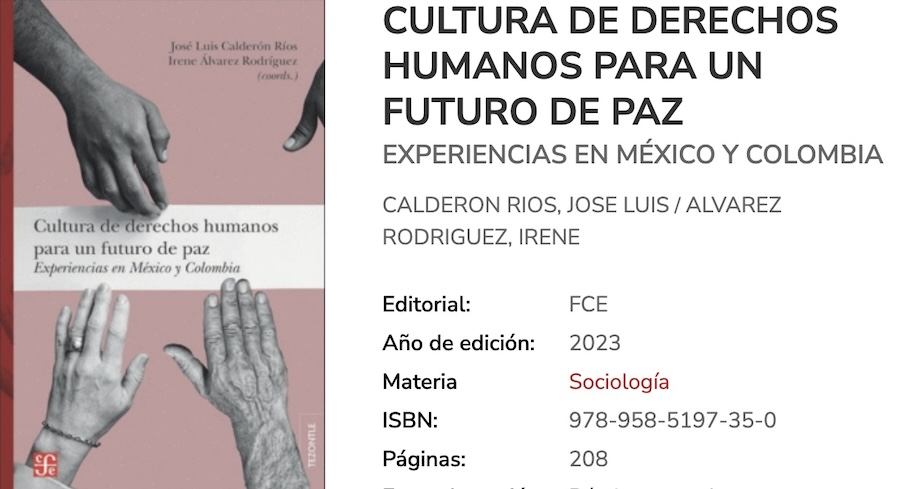EDUCATION FOR PEACE .
A note from the Secretaría de Gobernación de México
Peace is a constant search, it is something that requires permanent work. When we talk about peace we refer to the dignity of life; the protection of individual and collective rights; and the generation of conditions for development.
This book is an initiative of the General Directorate of Public Policy and the Economic Culture Fund, which explores the construction of a culture of peace in relation to human rights. That is, it links the idea of making peace, understood as a way to address the causes of the conflict, with the prerogatives that allow the integral development of individuals. To address this question, a group of activists and academics who share an interest in exploring peacebuilding processes in Mexico and Colombia were invited.

This publication was officially presented at the Bogotá International Book Fair on April 20, 2023, and its content was discussed at a dialogue table that included the participation of the Mexican ambassador to Colombia and the Special Representative of the UN Secretary General in colombia.
It will soon be available at the Economic Culture Fund.
(Review continued in right column)
( Click here for the original version in Spanish.)
What are the most important books about the culture of peace?
Latin America, has it taken the lead in the struggle for a culture of peace?
(Review continued from left column)
Peace is more than the absence of armed conflict or criminal violence. This book questions the dominant notions of peace, often associated with the territorial integrity of a national State, and instead it confronts the processes of domination, injustice and inequality. For many of the authors, achieving peace is a process that cannot be achieved until structural violence, such as poverty or impunity, is overcome. In that sense, peace is conceptualized in a broad way, not from the negative definition of a pure absence of war, but as a positive statement. That is to say, peace becomes an alternative to militarist and sexist ideologies, to criminal violence and to warlike values.
* Total peace and human security in Colombia: potentialities and limitations / Pablo Emilio Angarita Cañas
* Moving towards peace: neuroscientific perspectives from Mexico / Roberto Emmanuelle, Mercadillo Caballero
* The challenges of peacebuilding in contexts of chronic violence and persistent human insecurity in Latin America / Alexandra Abello Colak
* The total peace in Colombia: a necessary attempt / Juan Camilo Pantoja, Raúl Zepeda Gil
* About the identity and particularity of education in the key to building a culture of peace: contributions for Colombia / Alicia Cabezudo
* Peace and human rights / Miguel Concha Malo, Carlos Ventura Callejas
* Weeding out militarism: cultures of peace in the struggle of the Lesvy Berlin femicide case Rivera Osorio / Sergio Beltrán-García
* How to discern the nuances of apparent forms of peace: a tale of two peoples / Trevor Stack